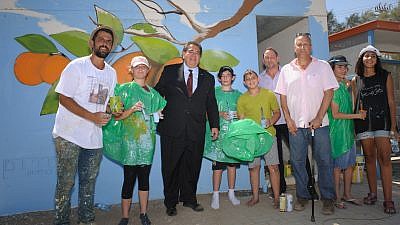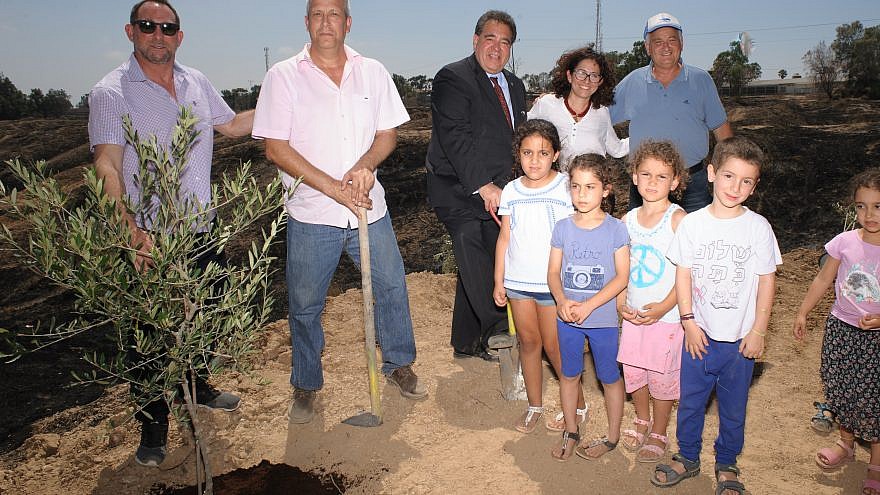Ilana Safaniev of Sderot, a town on Israel’s southern border with Gaza, isn’t thinking about the barrage of incendiary kites or balloons scorching the land, homes and communities of Israel’s Western Negev. She’s also not worried if the all-too-familiar siren will warn of an imminent rocket attack, allowing for just 15 seconds to find a bomb shelter. Instead, she’s relaxed and lightheartedly watching her two young children run and play with friends, at a distance considerably more than 15 seconds from her arms.
Safaniev and her kids are spending time at the world’s largest indoor fortified playground, extending 25,000 square feet and containing 300 tons of 25-gauge steel. Instrumental during the intense rockets attacks that began in 2009, the playground has become a hub for families, schools and visitors—a safe place giving the area’s residents a chance to feel at ease.
“Children weren’t playing,” says Russell F. Robinson, CEO of Jewish National Fund-USA, on a recent visit to the JNF Sderot indoor recreation center while touring the region to oversee numerous relief efforts. “If you were a parent, you would never let your child outside to play. Sderot was missing what you hear today: noise. We decided we had to do something. Here, the beautiful sound is just noise. This is what it’s all about. It’s our biggest blue [tzedakah] box in the world. And instead of coins filling it up, it’s children.”
The playground’s impact on Sderot and the Gaza-envelope region cannot be overstated.
“Sderot is very strong,” says Shmuel Ohayon, the recreation center’s manager since its opening and a lifelong resident of Sderot. “We have 27,000 residents in Sderot. By 2020, we want at least 30,000, and the playground is helping us grow. All the children here are my family; I am like a big father to all of them. I live to see children smiling and laughing. It’s what makes my heart grow.”

Giving families a safe place to play is also crucial for dealing with the high rates of post-traumatic stress disorder for area residents, especially children, according to Alon Davidi, the mayor of Sderot.
The playground, he says, “is a miracle. If someone said to me, we need to build this, I couldn’t. It’s a lot of money. I’m so happy that we have JNF to help us. They are very connected to us, always supporting us, always pushing me to think about the next project.” And, in addition to the indoor playground, “because of American donors, we are building more parks in Sderot, new housing projects, and now, resilience centers where we focus on helping PTSD children.”
Davidi became a bit more personal, sharing, “I have two daughters who suffer from this problem, so I know. At the resilience centers, children choose an animal and then use this animal for therapy. My daughter used to be afraid to go outside, and with canine therapy, she’s overcoming her fear.”
‘Fire wagons’ to help tackle incendiary devices
In Kissufim, a town just minutes from Sderot and even closer to the Gaza border, JNF’s efforts are tangible as well. At a dedication ceremony last week, Robinson presented Kissufim and its regional representatives with specially designed “fire wagons” to help combat the unique challenges posed by kite bombs.
These incendiary devices launch and land so fast that Israel’s firefighters and first responders face the challenge of controlling the fires and minimizing damage in terrain where traditional firetrucks and equipment often prove ineffective.
The nine fire wagons contain industrial-sized water canisters, and can tackle the area’s rugged landscape faster and more effectively than firetrucks.
“JNF-USA helps us build infrastructure; it’s not just the fire wagons,” says Gadi Yarkoni, the mayor of the Eshkol region, speaking to families, children, security officials and local leaders. “It’s also housing-development projects, fortifying kindergartens—to our JNF family, I want to thank you very much for what you are doing for Eshkol!”


























